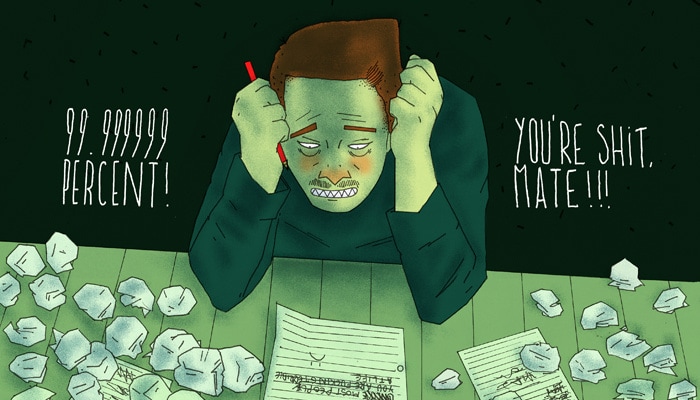Symptoms and causes to stress and depression
within an academic context
|
Working in academia has several advantages such as executing cutting-edge science, meeting people from all over the world, ability to teach, etc. However, the academic circle is also frequently associated with signs of stress and depression. This part aims to identify the symptoms and causes.
Disclaimer: the author of the page is not a medical doctor. The messages on this topic serve primarily to address the existing taboo on the issue, and feedback from health care professionals should be sought after by those in need. |
|
1.1.2. PressureFEELING pressured is an important symptom of stress. It should not be mistaken with BEING pressured. It is often the case that when you take a moment to think about the position you are in, that the imagined pressure is in fact not there. This is of course increased by rushing things...
|
1.1.3. No longer enjoy thingsWhen you rush something, you may have noticed that you can no longer enjoy it. By placing too much emphasis on the end result, the process becomes an obstacle... When this symptom occurs also in the private domain, the problem is severe as this may inhibit the ability to relax...
|
1.1.4. Exorbitant occurrence of frustration and angerWhen rushing things and feeling pressured, it can occur that you 'detonate' without a real cause. This for example occurs when someone is bashing in a screen or keyboard because something does not work. This becomes a rather dangerous symptom when you wrongfully accuse or even insult colleagues...
|
1.1.5. Physical symptomsA surprisingly large amount of physical symptoms are related to stress: muscle pains, tense muscles, twitches, increased heart rate, increased blood pressure, irritable bowel syndrome, insomnia, etc.These can be interpreted as your body telling you: "da fak, this is not the way forward, bro!"
|
2.1.2. PersonallyAs a person, trying to be perfect is impossible. Even trying to be simply 'fine' does not always apply. Hence, trying to be perfect can only be achieved by either lying to yourself or denial. In both cases, the resulting alienation from yourself (and others) may lead to isolation (see below).
|
2.1.3. SociallySocial perfectionism implies that you try to please everybody. In doing so, not only may you end up lying to yourself and others, you may also take on too many tasks increasing your stress levels. For example, when you are already clearly busy, you may take on an extra task simply because somebody asks you....
|
2.2.1. SocialDoing research often involves a high dedication and occasionally long hours. As such, you may no longer be able to contact your social network. This is especially true for people that change country for research. In this case, the entire social network becomes marginalized, making social isolation more likely.
|
2.2.3. ScientificScientific isolation occurs when you are not able to discuss your science with anybody. This can be due to a lack of time (of the supervisor) and/or simply because nobody else in your research group has the expertise. This type of isolation also increases strongly with the degree of brilliance. So no risk for the author of this webpage ;)
|
2.3. DependenceA large factor contributing to stress is the dependence on a single person. For example, for PhD students their future depends strongly on the outcome of the PhD. This is turn also relies strongly on the acting supervisor. This can create an unhealthy power balance. Especially, in the case of a perfectionist, this further strengthens the inability to say no...
|
2.4. Insecurity about the futureInsecurity about the future can be a large source of stress. Not knowing where you will be, what you will be doing (and earning), and with whom can be challenging. In academia, where permanent positions are scarce, such insecurity is common. This is of course even more intense when you have to take care of a family, and/or when you experience societal pressure.
|
A PhD: the potential perfect stormPerforming an international PhD can be an outstanding scientific, personal, cultural, and societal experience. However, it also combines all the possible causes that can give rise to psychological issues: You take an intelligent person out of his steady place in society, to put in him another culture in a demanding environment highly dependent on a single supervisor. The risks can become larger in programs where the student moves frequently from group to group, country to country, as occurs for example in the European Erasmus Mundus program.
|
Further readingUpdate I: Check out the very intense academic struggle of Dr. Dolan and Dr. Rosten on Physics Today (left, button) and the associated paper (right, download):
Update II: Research at Flemish universities are concerned regarding the impact of academic workings on mental health. Check out the related 'Research Policy' paper below:
Update III: An on-topic contribution by the C&EN (chemical and engineering news) site on graduate student mental health and suicide (button, left). The associated scientific work as download on the right:
| ||||||||||||

























